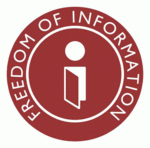Freedom of Information Act (United States) facts for kids
The Freedom of Information Act (FOIA) is a special United States federal law. It lets people ask for information and documents that the U.S. government has but hasn't shared yet. This law helps make sure the government is open and honest with its citizens. It explains what kinds of government records can be shared. It also describes how people can ask for these documents. The law also lists nine reasons why some information might be kept private. President Lyndon B. Johnson signed this important law on July 4, 1966. It started working the next year.
Contents
What is the Freedom of Information Act?
The Freedom of Information Act, often called FOIA, is a law that gives you the right to see government records. It means that most documents held by the U.S. government should be available to the public. This helps people understand what their government is doing. It also helps keep the government accountable.
Why was FOIA created?
Before FOIA, it was hard for regular people to get information from the government. The government could keep many things secret. People wanted more openness. They believed that citizens should know what their government was doing. This idea led to the creation of FOIA. It was designed to make government information more accessible.
How does FOIA work for you?
If you want to know something the government has recorded, you can make a FOIA request. You send a formal request to the government agency that might have the information. For example, if you want to see records from a specific department, you would ask them directly. The agency then has to look for the records you asked for. They must decide if they can share them with you.
What kind of information can you ask for?
You can ask for many types of government records. This includes reports, emails, letters, and data. These are called "agency records." An agency is a part of the government, like the Department of Justice. The law says what kinds of records are covered. It also explains how agencies should handle requests.
When can information be kept private?
While FOIA promotes openness, some information must stay private. The law lists nine reasons, called "exemptions," why an agency might not share certain records. These exemptions protect things like national security secrets. They also protect personal privacy. For example, an agency cannot share your private medical records. They also cannot share trade secrets from businesses.
Important moments in FOIA history
The Freedom of Information Act has been updated several times. These updates have made the law stronger. They have also made it easier for people to get information.
Signing of the original FOIA law
President Lyndon B. Johnson signed the original FOIA law. This happened on July 4, 1966. Even though he had some doubts, he signed it into law. This was a big step for government transparency. It changed how the government interacts with its citizens.
How FOIA helps people today
FOIA is still very important today. Journalists use it to uncover important stories. Historians use it to learn about the past. Regular citizens use it to get information about their communities. It helps everyone stay informed. It also helps hold government agencies responsible.
Images for kids
-
Freedom of Information Act requests have led to the release of information such as this letter by J. Edgar Hoover about surveillance of ex-Beatle John Lennon. A 25-year battle by historian Jon Wiener based on FOIA, with the assistance of lawyers from the ACLU, eventually resulted in the release of documents like this one.
See also
 In Spanish: Freedom of Information Act para niños
In Spanish: Freedom of Information Act para niños
 | Janet Taylor Pickett |
 | Synthia Saint James |
 | Howardena Pindell |
 | Faith Ringgold |





